Moms Who Self-Destruct
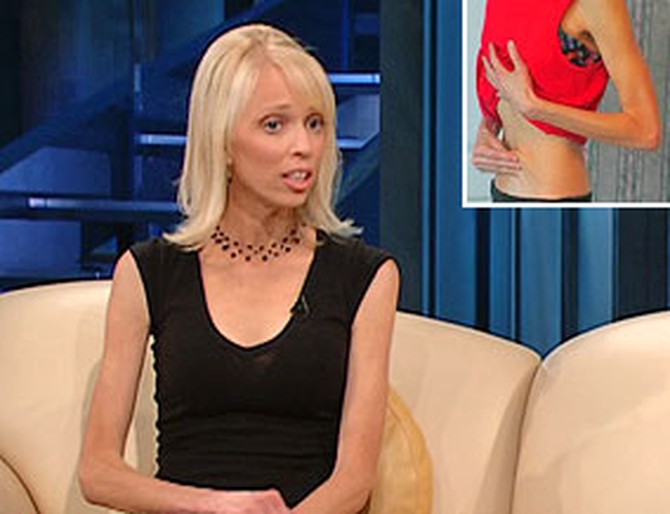
When The Oprah Winfrey Show asked women what is missing in their lives, the number one answer was "love for myself." According to Dr. Robin Smith, there are many signs that you may be suffering from a lack of love for yourself. Eating or drinking too much, abusing drugs, overspending, working too hard or even gossiping could all be signs of a lack of self-love.
This self-hatred can even be deadly. Leigh has been married for 12 years, has two children, and is dangerously anorexic. She is 5-foot-6 and weighs 82 pounds—less than an average 10-year-old girl.
Leigh says she used to work out two hours a day, but now after 20 minutes her weak body can't take any more exertion. Leigh says she's disappeared both physically and emotionally. "I used to be the life of the party," she says. "Nobody really wants to be around me anymore."
Leigh has begun worrying how her disease is affecting her 8-year-old son, Benton, who weighs nearly as much as his mom. "My children eat, but they see how I eat and [in turn] don't eat snacks," Leigh says. "It's not that I try to keep it from them, but I worry about my oldest and I worry about what he's going to eat."
This self-hatred can even be deadly. Leigh has been married for 12 years, has two children, and is dangerously anorexic. She is 5-foot-6 and weighs 82 pounds—less than an average 10-year-old girl.
Leigh says she used to work out two hours a day, but now after 20 minutes her weak body can't take any more exertion. Leigh says she's disappeared both physically and emotionally. "I used to be the life of the party," she says. "Nobody really wants to be around me anymore."
Leigh has begun worrying how her disease is affecting her 8-year-old son, Benton, who weighs nearly as much as his mom. "My children eat, but they see how I eat and [in turn] don't eat snacks," Leigh says. "It's not that I try to keep it from them, but I worry about my oldest and I worry about what he's going to eat."
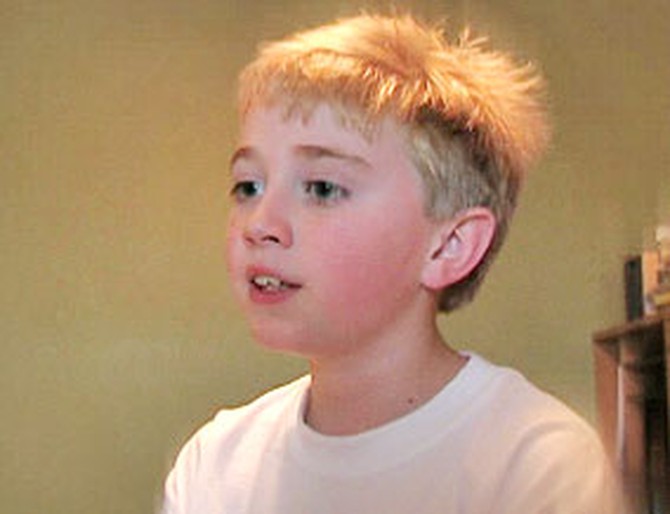
In what Oprah calls "one of the saddest things" she's ever heard, Leigh's son, Benton, shares his feelings on his mom's health.
"I wish my mom could play longer with me. Because of her energy loss, she sometimes just doesn't feel like doing anything. I feel kind of sad because my dad usually gets onto her because she doesn't eat enough. And he always says, 'If you put on about 30 more pounds, I'll be happy.' I feel a little sad for her because I know she can't put on 30 more pounds because she doesn't eat enough.
"At supper, she usually eats way before us. Sometimes I would like to prepare supper for her so that she can eat a little more.
"When my mom and dad are in the arguments and I'm still awake, I get pretty scared when my dad yells. And my mom usually just says, 'This is the way I want it.' She asks me sometimes if she needs to gain a little more weight, so she knows that I'm thinking about it. Usually I don't ask her because I don't know if it will hurt her feelings or not. Telling her that she needs to gain a little more weight, that she needs to play with us more. If I asked her that, well, she'll probably say, 'I'm doing the best I can.'"
"I wish my mom could play longer with me. Because of her energy loss, she sometimes just doesn't feel like doing anything. I feel kind of sad because my dad usually gets onto her because she doesn't eat enough. And he always says, 'If you put on about 30 more pounds, I'll be happy.' I feel a little sad for her because I know she can't put on 30 more pounds because she doesn't eat enough.
"At supper, she usually eats way before us. Sometimes I would like to prepare supper for her so that she can eat a little more.
"When my mom and dad are in the arguments and I'm still awake, I get pretty scared when my dad yells. And my mom usually just says, 'This is the way I want it.' She asks me sometimes if she needs to gain a little more weight, so she knows that I'm thinking about it. Usually I don't ask her because I don't know if it will hurt her feelings or not. Telling her that she needs to gain a little more weight, that she needs to play with us more. If I asked her that, well, she'll probably say, 'I'm doing the best I can.'"
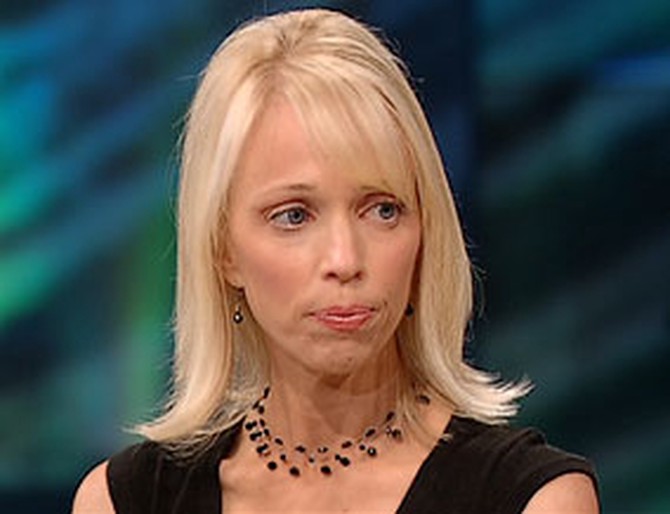
After hearing Benton say how sad he is about her eating disorder, Leigh tearfully says, "I guess they understand more than you think, don't they?"
Dr. Robin urges Leigh to understand the impact her anorexia has on Benton. "When you have children, we give up our right to self-destruct because there are people depending on you," she says.
Dr. Robin urges Leigh to understand the impact her anorexia has on Benton. "When you have children, we give up our right to self-destruct because there are people depending on you," she says.
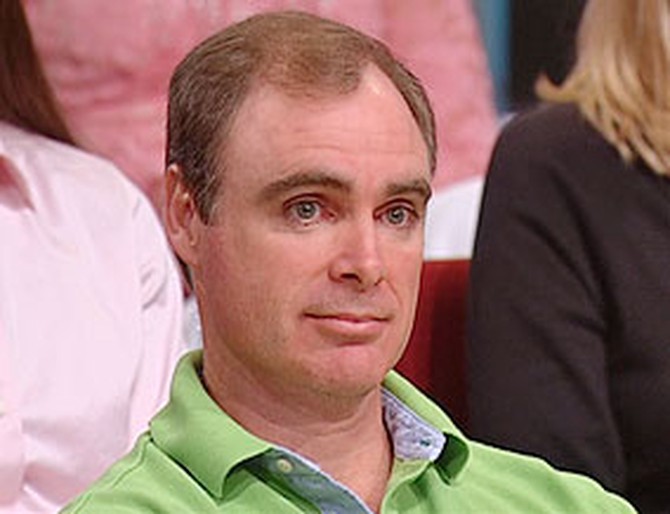
Leigh's husband, Brian, also has been struggling with his wife's anorexia. He says that in the past he has begged her to eat. Dr. Robin is distressed by his attitude. "If the ship is going down," she asks, "do you plan on it going down with you and your sons in it?"
"Yes, we'll be there," Brian says.
"That's a problem," Dr. Robin explains. "We think love means, 'I'll go down with the ship.' If we have kids, some parent must say, 'If this ship is sinking, it will not take my children down with it.'"
"Yes, we'll be there," Brian says.
"That's a problem," Dr. Robin explains. "We think love means, 'I'll go down with the ship.' If we have kids, some parent must say, 'If this ship is sinking, it will not take my children down with it.'"
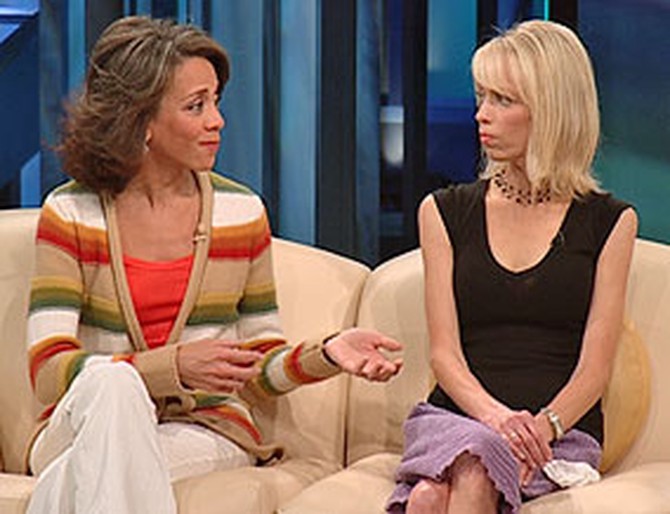
Dr. Robin says that the origins of Leigh's anorexia can be found well before the date she actually stopped eating regularly. Leigh says that though she was adopted, she had a "wonderful childhood." Dr. Robin asks her to more deeply analyze her feelings about being adopted.
"Now I'm more okay with it," Leigh says. "But as a child you wonder, 'Why didn't someone love me?'"
"In many ways, you are still a child who is still asking, 'Why am I unimportant?' And how do I know that? You're evaporating, you are becoming invisible," Dr. Robin says. "You are willing to die and leave your children and your husband alone to prove the fact that she wasn't worthy to be kept."
Dr. Robin says that anorexics like Leigh, and people who otherwise abuse themselves, are refusing to feed themselves physically, emotionally or spiritually. "You are redoing that pain and showing yourself that you deserve to be rejected," she says.
"Now I'm more okay with it," Leigh says. "But as a child you wonder, 'Why didn't someone love me?'"
"In many ways, you are still a child who is still asking, 'Why am I unimportant?' And how do I know that? You're evaporating, you are becoming invisible," Dr. Robin says. "You are willing to die and leave your children and your husband alone to prove the fact that she wasn't worthy to be kept."
Dr. Robin says that anorexics like Leigh, and people who otherwise abuse themselves, are refusing to feed themselves physically, emotionally or spiritually. "You are redoing that pain and showing yourself that you deserve to be rejected," she says.
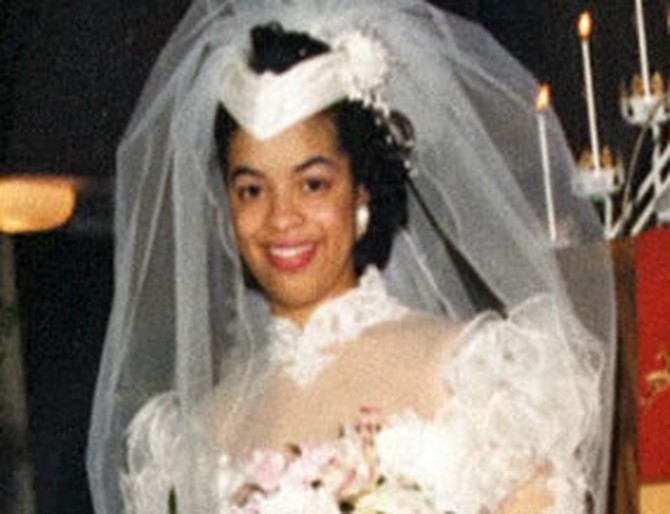
As a college student, Lauren was the life of the party. "I was the most popular girl on campus," she says. "I was voted Miss Lincoln University. I was very confident. I don't feel that anymore." Lauren now describes herself as the "funny, fat girl" and says her friends and family would be shocked to hear she is hiding so much pain.
Over the course of several years and two failed marriages, Lauren began to overeat in order to cope with her feelings of rejection. Lauren has gained more than 100 pounds and is married for the third time, this time to her personal trainer. Lauren says her husband verbally abuses her daily about her weight. "My husband calls me 'fat ass,'" she says. "He always makes me feel like I'm nothing."
Over the course of several years and two failed marriages, Lauren began to overeat in order to cope with her feelings of rejection. Lauren has gained more than 100 pounds and is married for the third time, this time to her personal trainer. Lauren says her husband verbally abuses her daily about her weight. "My husband calls me 'fat ass,'" she says. "He always makes me feel like I'm nothing."
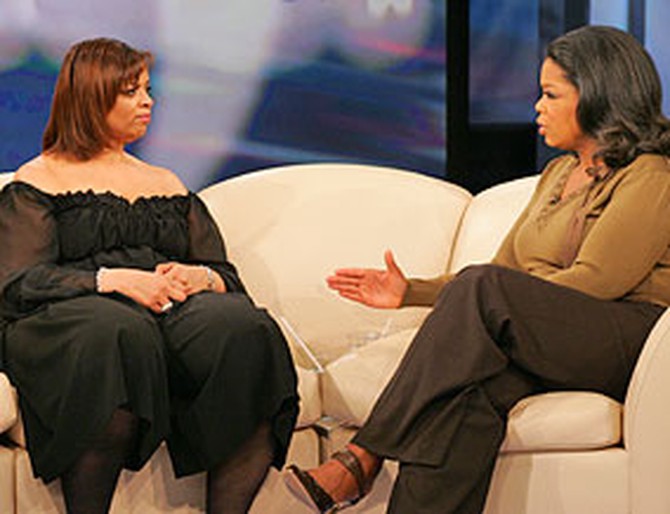
Lauren says she also drinks to numb her pain and has often driven drunk. "With drinking, you can create your own reality," she says. "Sometimes people say things that hurt your feelings. Instead of dealing with what they're saying or making a change, you just want to forget about it."
Lauren says she's ashamed that her kids have found her passed-out on the couch after her binges. "I don't want them to see me like that anymore," she says.
Lauren says she's ashamed that her kids have found her passed-out on the couch after her binges. "I don't want them to see me like that anymore," she says.
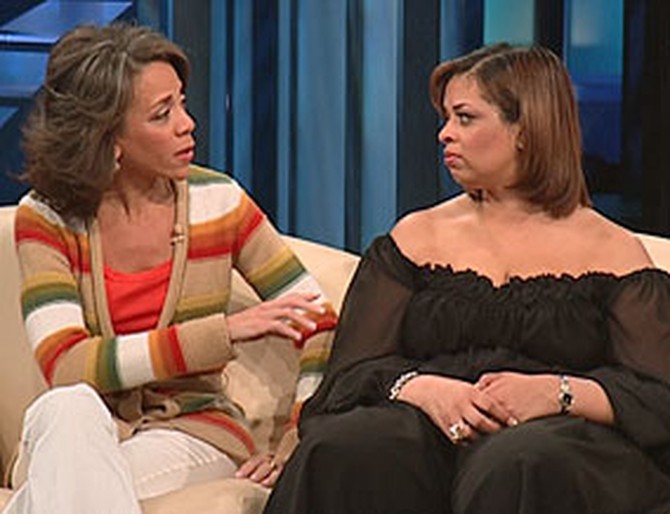
Dr. Robin says that many women use alcohol as a distraction from life's frustrations. "It gives you a sense that you're okay, that you're not hurting," Dr. Robin says. "The insults, you can let them roll off your back, but it's only because you're high, you're drunk, you're vacant—you're not there."
Lauren's overeating is the flipside to Leigh's anorexia. "The huge connection between the two stories is that [both Lauren and Leigh] feel they're not worthy," Oprah says. "They are harming themselves to 'prove' that something is wrong [with them]."
Lauren's overeating is the flipside to Leigh's anorexia. "The huge connection between the two stories is that [both Lauren and Leigh] feel they're not worthy," Oprah says. "They are harming themselves to 'prove' that something is wrong [with them]."
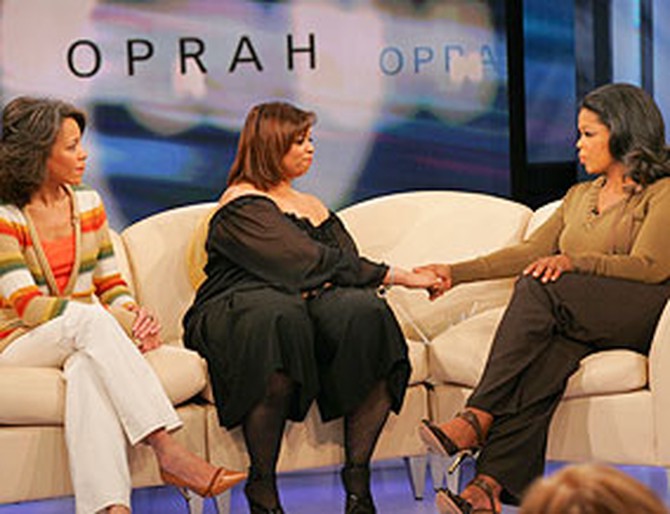
Oprah asks Lauren to begin her recovery by making a commitment to stop drinking and driving.
Oprah: Promise me—no matter what else you do—you will never drink and get in a car and drive again. There are so many lives that have been destroyed [by drunk driving]. ... Do you promise?
Lauren: I promise.
Dr. Robin: It's [your] first step in loving yourself. It's [your] first step in being worthy. ... It's a step of loving you to not drink and drive.
Lauren: I need to love myself. I need to stop relying on other people to make me happy. I need to find worth and happiness within myself.
Oprah: Promise me—no matter what else you do—you will never drink and get in a car and drive again. There are so many lives that have been destroyed [by drunk driving]. ... Do you promise?
Lauren: I promise.
Dr. Robin: It's [your] first step in loving yourself. It's [your] first step in being worthy. ... It's a step of loving you to not drink and drive.
Lauren: I need to love myself. I need to stop relying on other people to make me happy. I need to find worth and happiness within myself.
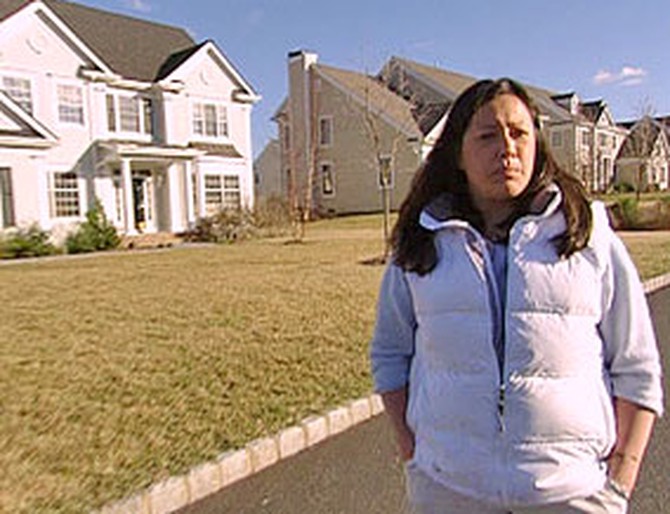
Tracey, a mother of two, says she is self-destructing. At age 24, when she still felt thin and attractive, she fell in love with Steve, an investment banker. Soon she was living a lifestyle far removed from her modest roots. Tracey now lives in a million-dollar home, but she says she still feels like "a piece of trash." She's gained 60 pounds in the past four years and feels her husband is repulsed by the way she looks. "We have sex occasionally," she says. "He never initiates—it's always me seeking him out. ... I would love for my husband to be proud of the person that I am and to be proud to have me on his arm. I feel like I'm dead on the inside."
"Everything you [are] saying about your husband is what you need to feel for yourself," Oprah says.
"Everything you [are] saying about your husband is what you need to feel for yourself," Oprah says.
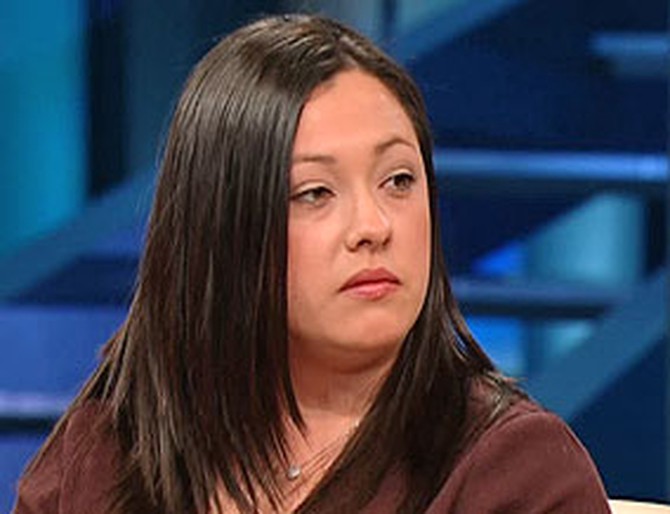
Where did Tracey learn to feel unworthy? Dr. Robin says self-hatred does not start in adulthood.
"It absolutely started in my childhood," Tracey says. "[I was] abused."
By understanding how her wounding has shaped her life today, Dr. Robin says Tracey can learn to feel differently about herself. Even though her feelings of worthiness were robbed from her in childhood, it's not too late to reclaim them. "It was rooted in somebody else's lie about [you] or somebody else's misery about themselves," Dr. Robin says. "The healing happens when we can rewrite the script."
What's missing in your life? Dr. Robin helps you launch your personal comeback.
"It absolutely started in my childhood," Tracey says. "[I was] abused."
By understanding how her wounding has shaped her life today, Dr. Robin says Tracey can learn to feel differently about herself. Even though her feelings of worthiness were robbed from her in childhood, it's not too late to reclaim them. "It was rooted in somebody else's lie about [you] or somebody else's misery about themselves," Dr. Robin says. "The healing happens when we can rewrite the script."
What's missing in your life? Dr. Robin helps you launch your personal comeback.
Published 05/11/2006

